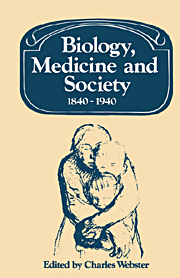Book contents
- Frontmatter
- Contents
- Contributors
- Preface and Acknowledgements
- Introduction
- 1 Women's Health and the Women's Movement in Britain: 1840–1940
- 2 Working-Class Mothers and Infant Mortality in England, 1895–1914
- 3 Theories of the Cell State in Imperial Germany
- 4 Innate Character in Animals and Man: A Perspective on the Origins of Ethology
- 5 Genetics in the United States and Great Britain 1890–1930: A Review with Speculations
- 6 Eugenics and Class
- 7 Sociobiologies in Competition: The Biometrician–Mendelian Debate
- 8 Psychologists and Class
- 9 Measuring Intelligence: English Local Education Authorities and Mental Testing 1919–1939
- Index
6 - Eugenics and Class
Published online by Cambridge University Press: 02 December 2009
- Frontmatter
- Contents
- Contributors
- Preface and Acknowledgements
- Introduction
- 1 Women's Health and the Women's Movement in Britain: 1840–1940
- 2 Working-Class Mothers and Infant Mortality in England, 1895–1914
- 3 Theories of the Cell State in Imperial Germany
- 4 Innate Character in Animals and Man: A Perspective on the Origins of Ethology
- 5 Genetics in the United States and Great Britain 1890–1930: A Review with Speculations
- 6 Eugenics and Class
- 7 Sociobiologies in Competition: The Biometrician–Mendelian Debate
- 8 Psychologists and Class
- 9 Measuring Intelligence: English Local Education Authorities and Mental Testing 1919–1939
- Index
Summary
Even to discuss eugenics in class terms is an enterprise of which many British eugenists earlier in the century would have disapproved, since they clung tenaciously to the view that the ideology they were propounding was sanctioned by science. Eugenics, they claimed, rested upon ‘laws of biology’, which no more admitted of subjective interpretation than did the ‘law of gravity’; those who denied these laws were guilty of the same sort of anti-scientific obscurantism which, a generation earlier, had led pious Christians into seeking to deny the validity of Darwinian biology. On the other hand, some eugenists did also devote much time and energy to debating the class implications of their creed and in the course of doing this they were to elaborate a highly idiosyncratic explanation of the British social system.
At the heart of eugenics was a fear about the likely consequences of differential class fertility. Eugenists interpreted the tendency of better-off groups to have smaller families than those beneath them in the social and economic scale to mean that the ‘superior’ stocks were dying out, while the ‘unfit’ continued to multiply; this demographic process, they argued, was producing progressive racial deterioration, alarming symptoms of which could already be seen. Eugenists were concerned, therefore, to stimulate the fertility of the better stocks (‘positive eugenics’) and to take whatever steps were feasible and politically acceptable to slow down the rate of reproduction at the bottom end of the social scale, steps which might include the placing of certain diseased and degenerate groups of people under custodial care so that they could be sexually segregated (‘negative eugenics’).
- Type
- Chapter
- Information
- Biology, Medicine and Society 1840–1940 , pp. 217 - 242Publisher: Cambridge University PressPrint publication year: 1981
- 8
- Cited by

